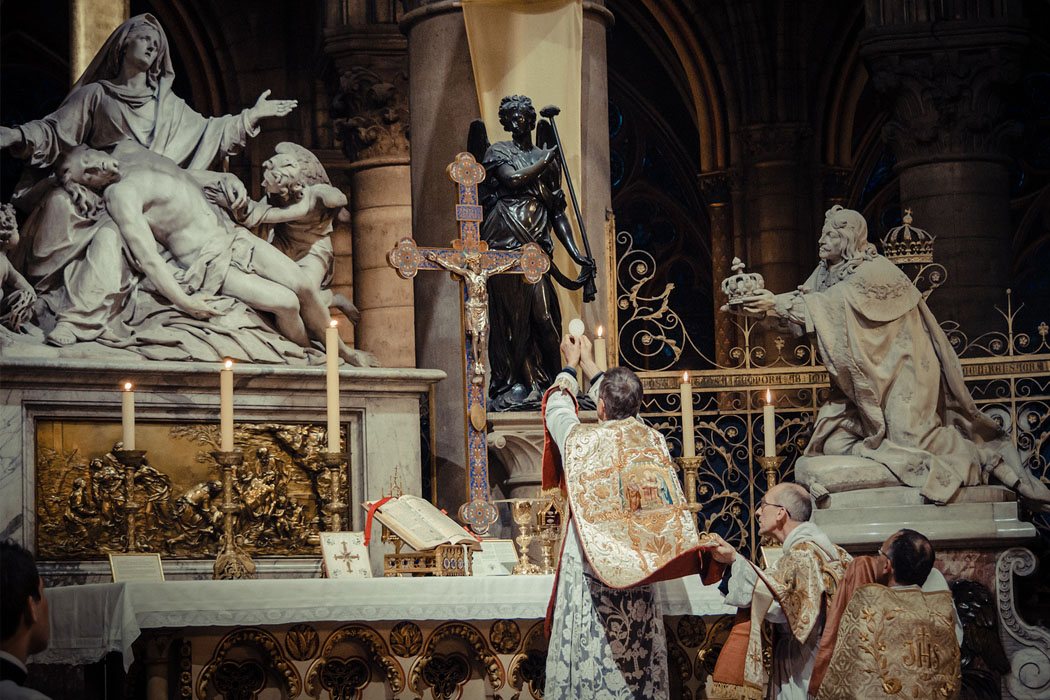
The Eucharist is a sacrifice, a presence and a food. As a sacrifice it makes present Jesus Christ’s sacrifice on Calvary for our salvation. As a presence, it is Jesus Christ himself under the appearances of bread and wine. As a food, it is the nourishment of our souls by which we share in God’s own life.
The Eucharist as Sacrifice
Uniquely among the sacraments, the Eucharist is also a sacrifice, the sacrifice of Christ himself. Sacrifices offer something up to God to honour him, to thank him, to gain communion with him and to make expiation for sin. The Eucharistic sacrifice of Christ achieves all of these perfectly.
Sacrifices in the Old Testament
Both unbloody and bloody kinds of sacrifice were prominent in the Old Testament. Examples of the former were Melchizedech’s offering of bread and wine and the yearly offering of the first-fruits of the harvest. The pre-eminent example of the latter was the sacrifice of Passover. Shedding the blood of the Paschal lamb and eating its flesh marked the ‘passing over’ from sin and death to freedom and life. These sacrifices were commanded by God as provisional and prophetic, offsetting some of the effects of sin. However, these imperfect sacrifices of fallen humanity could never achieve our redemption or unite us to God (Heb 10:1).
The Eucharistic sacrifice of Christ
When Jesus began his mission, John the Baptist declared him to be “the Lamb of God, who takes away the sin of the world” (John 1:29). By these words John indicated that Jesus is the perfect sacrifice prefigured by the Old Testament sacrifices. Jesus confirmed that he would offer his flesh for the life of the world (John 6:51). At the feast of Passover, he took bread and wine and offered up his imminent death for our salvation.
“This is my body which will be given up for you… this is the cup of my blood, the blood of the new and everlasting covenant. It will be shed for you and for all so that sins may be forgiven.” Words of Consecration in the Mass (Mt 26:26-28; Mk 14:22-24; Lk 22:17-22; 1 Co 11:23-25)
Jesus added, “Do this in memory of me.” Therefore the Church, through her priests, continues to offer the same Eucharistic sacrifice. Christ’s offering on Calvary and its salvific effects are thereby made present to all ages until the end of time.
For as often as you eat this bread and drink the cup, you proclaim the Lord’s death until he comes. 1 Co 11:26
The Eucharist as Presence
Is Jesus really present in the Eucharist?
Jesus promised to give food from heaven that would be his flesh and blood (Jn 6:51-56). He fulfilled this at the Last Supper, when he took the bread and said explicitly “this is my body” and when he took the wine and said “this is the cup of my blood.”
This gift is also made present to us today. When the priest speaks the words of consecration in the Mass, the bread and wine truly become the body and blood of Jesus Christ. The Church calls this change ‘transubstantiation’ because the substance of bread and wine are really changed, becoming the substance of Jesus Christ himself. Jesus also said before his Ascension to the Father: “I am with you always; yes, to the end of time” (Matthew 28:20). This promise is fulfilled in the real presence of the Eucharist in the tabernacle of every Catholic church.
The Eucharist as Food
Following Jesus’ command “Take this, all of you, and eat it… Take this… and drink from it”, the Eucharist has always been celebrated as a sacred meal. The benefits for us are:
Union. By consuming his life we become like him, and he dwells within us. For this reason the Eucharist is also called Holy Communion. As a meal, it also expresses intimacy with Christ and unity with the whole Church (1 Co 10:17).
Strength. By consuming divine food, we gain nourishment in the divine life that Christ has shared with us. The form of bread is a sign that the Eucharist gives us sustenance for our spiritual journey, and especially at the approach of death.
Promise. By receiving the risen Jesus, we also receive in the Eucharist the power of his Resurrection within us. As he promised, “He who eats my flesh and drinks my blood has eternal life, and I will raise him up at the last day” (John 6:56 and 6:40).
The Mass as a sacred banquet on earth is also our sharing in something far greater in heaven. Scripture refers to a heavenly wedding feast, “Blessed are those who are called to the Marriage Feast of the Lamb” (Revelation 19:9).
This article is originally from ‘CREDO: The Catholic Faith explained’ by CTS.
Video resources